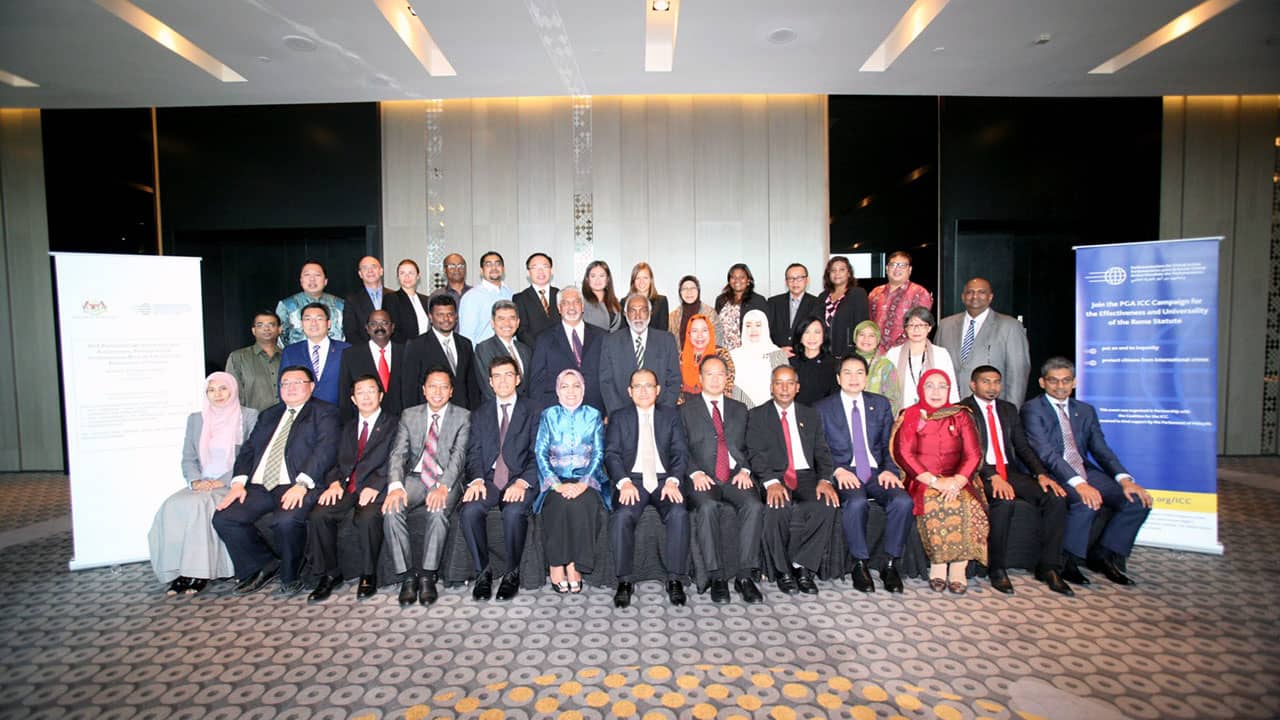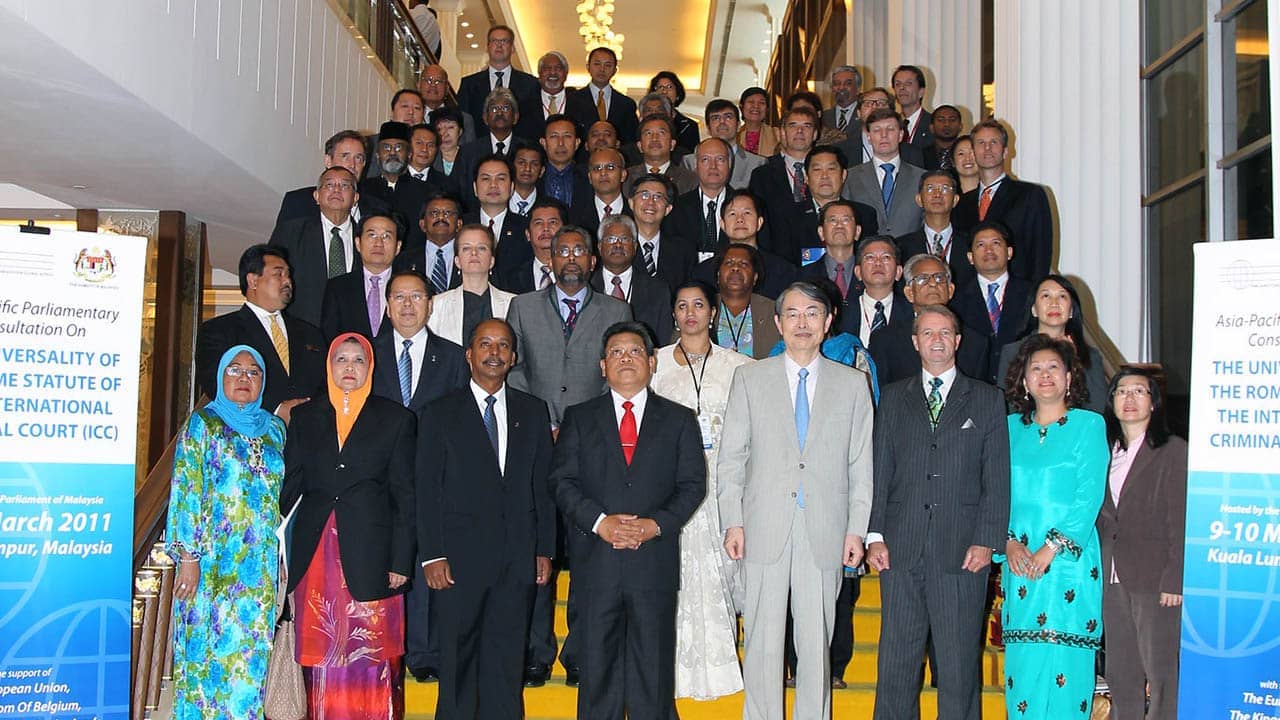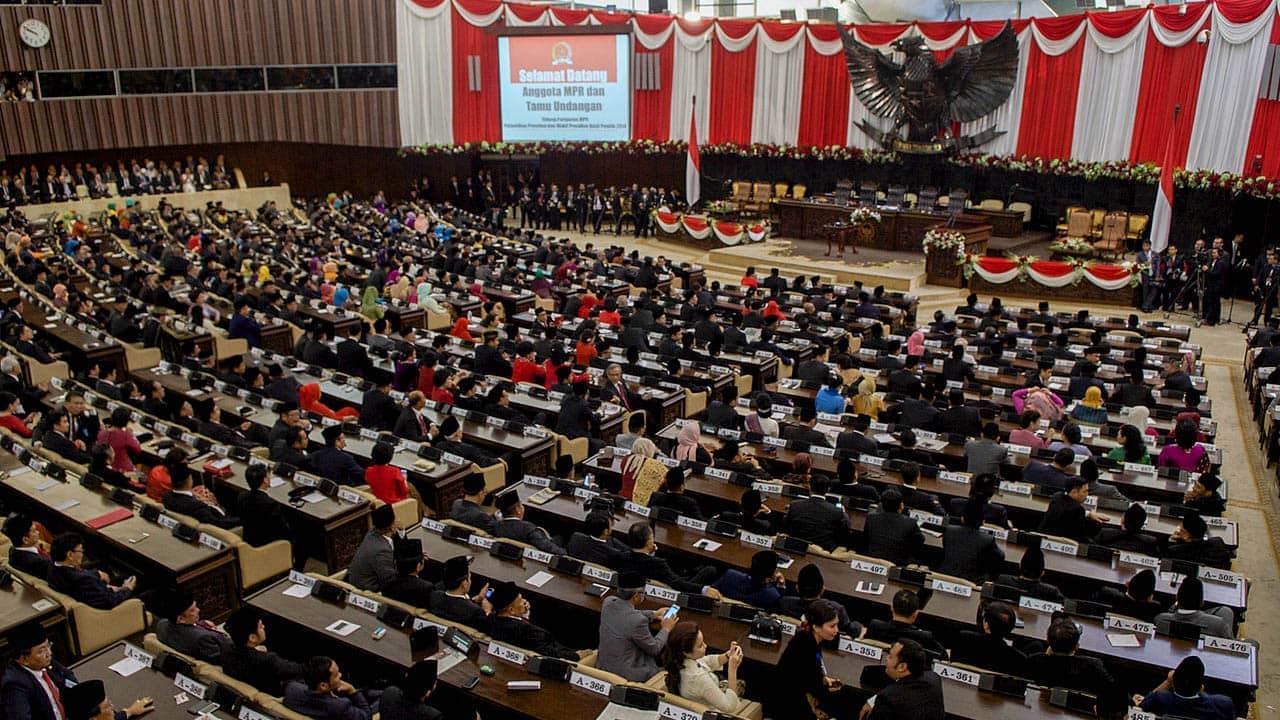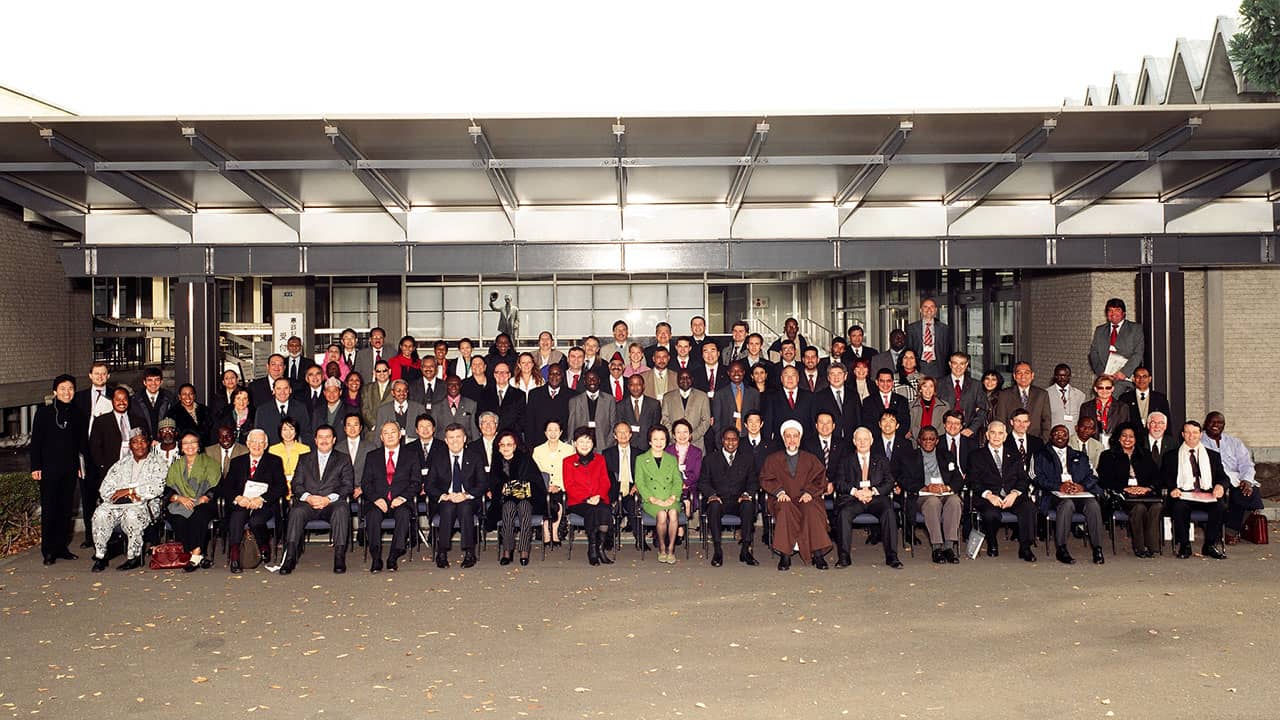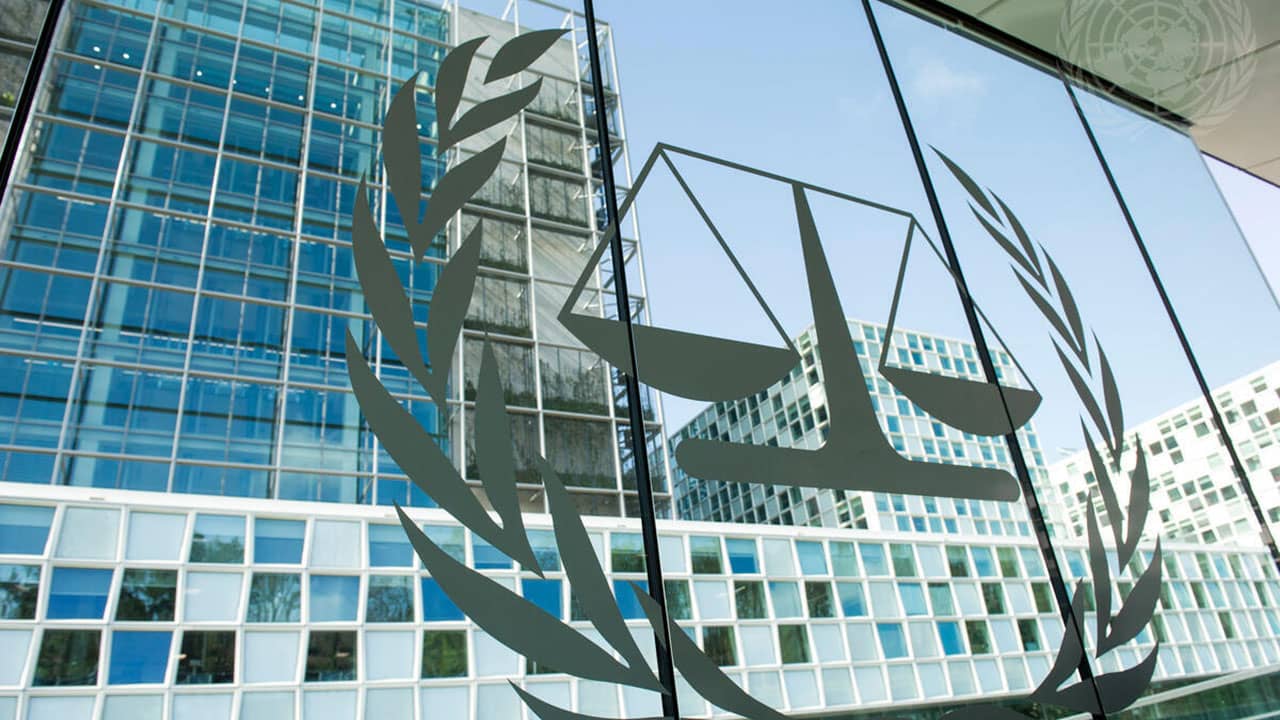After the electoral year of 2014, PGA is re-engaging with the new parliament since early 2015: The Indonesian Parliamentary elections were held in April 2014, for the 550-member People's Representative Council (Dewan Perwakilan Rakyat, DPR) and the 128-seat Regional Representative Council (Dewan Perwakilan Daerah, DPD). Furthermore, the Indonesian Presidential election was held in July 2014, Joko Widodo, of the Indonesian Democratic Party of Struggle, PDI-P, won the elections.
In May 2013, PGA organized a high-level field mission to Jakarta through which key stakeholders from parliament government and civil-society reaffirmed their support to ICC accession while the PGA delegation was able to meet with the only government agency undecided on this issue (Ministry of Defense).
In order to promote and follow-on to this public commitment, PGA Parliamentarians in Indonesia hosted another Round-Table Discussion on ICC Ratification and Implementation in the Parliament of Indonesia in 2009 (in Commission III, Legislation, Justice and Human Rights).
Parliamentarians for Global Action has worked on the process of Indonesian to the Rome Statute since 2004. As result from the work of PGA, in 2007 Indonesian Foreign Minister Wirayuda expressed his commitment to ratify the Rome Statute at the first PGA meeting in the Parliament of Indonesia (Commission I, Foreign Affairs & Defense). He also refused to sign a Bilateral Non-Surrender Agreement pursued at that time by the United States.
ROME STATUTE
Indonesia did not sign, and has yet to ratify the Rome Statute. Indonesia participated in the 1998 Rome Conference that adopted the ICC Statute with 120 votes in favor.
KAMPALA AMENDMENTS
Indonesia has yet to ratify the Kampala amendments. An Indonesia delegation attended the 2010 Review Conference of the Rome Statute in Kampala, Uganda as observer.
STATUS ON THE DOMESTIC IMPLEMENTATION OF THE ROME STATUTE
Indonesia has adopted Law # 26, also known as Human Rights Code, which came into force in 2000 and that incorporates genocide and certain crimes against humanity.
The domestic implementation of war crimes is partial. Substantive provisions corresponding to penal law provisions of the Geneva Conventions of 1949 had been partially incorporated in the Military Law Code of 1947. It seems that Indonesia does not have any legislation concerning war crimes in non-international armed conflicts.
There is no legislation on cooperation with the ICC.
AGREEMENT ON PRIVILEGES AND IMMUNITIES OF THE COURT (APIC)
Indonesia did not sign, and has yet to accede to the Agreement of Privileges and Immunities of the Court (APIC).
ADDITIONAL AGREEMENTS
- 2010-2014 Human Rights Action Plan of Indonesia, includes the ratification of the Rome Statute as a priority.
- On 5 December 2007, at the UN Security Council, and after the delivery of the Sixth Report on the situation of Darfur by the ICC Prosecutor, Amb. Natalewaga delivered a strong statement in support of the fight against impunity in Darfur and called upon the Council to secure cooperation between Sudan and the ICC.
- May 2012: Indonesia reports to the Human Rights Council a failure to meet the National Human Rights Plan and to fulfil the recommendation made at the UPR in 2008 to ratify the Rome Statute. Indonesia states that: “ratification of the Rome Statute is part of Indonesia’s commitments, as stipulated in the third Action Plan. Robust debates on the issue of ratification of Rome Statute have become a fact of life. Numerous workshops, seminar, and meetings have been conducted, as well as many experts and commentators have published their opinions on this issue. Indonesia remains committed to work progressively on this issue with a view to build a national consensus.” Thereafter, Indonesia accepted the numerous recommendations to ratify the Rome Statute.
- On 23 May 2012, at the 2nd Cycle of the Universal Periodic Review at the UN Human Rights Council, Indonesia received 12 recommendations (Sweden, Switzerland, United-Kingdom, Germany, Slovakia, Liechtenstein, Australia, Chile, Austria, Hungary, Latvia, Hungary, Latvia, and Slovenia) to ratify the Rome Statute. All of them were accepted by Indonesia. On April 2008, at the 1st cycle of the UPR, Indonesia had received similar recommendations which had accepted.
- 17 July 2012: The EU delegation in Jakarta (through the European Instrument for Human Rights) organised an event on documentation of past human rights abuses in Indonesia, in which the ICC ratification was addressed. Participants included representatives from the Government of Indonesia (Ministry of Foreign Affairs & Directorate General on Human Rights of the Ministry of Law and Human Rights, Ministry of Defense, Armed Forces) and Members of Parliament (MP).
- 31 August 2012, Declaration of the Non-Aligned Movement (NAM), Teheran, Calling upon those States, which have not yet done so, to consider becoming parties to the Rome Statute of the ICC Final Document of the Non-Aligned Movement (NAM) Summit
- Indonesia refused to sign a Bilateral Non-Surrender Agreement pursued by the United States between 2002 and 2006.
Progress and pga Action
- 4-5 December 2014: Indonesian delegation participated in the Consultative Assembly of Parliamentarians on the ICC and the Rule of Law (CAP-ICC) in Rabat, consisting of Hon. Muhammad Aziz Syamsuddin, MP Chair, Law, Legal Affairs, Human Rights, Security Committee and the Hon. Benny K. Harman, MP Vice-Chair, Law, Legal Affairs. The newly elected Chairperson of Commission III (Law, Justice and Human Rights”) in Indonesia’s Parliament affirmed his personal commitment to relaunch the ICC Accession process in the fourth largest country of the world, and discussed with the PGA Secretariat ways and means to host an international parliamentary forum in Jakarta. – 8th session CAP-ICC 2014 Outcome Document
- 12-15 May 2013: PGA Mission to Jakarta, consultations with the Executive (including the Military) and Parliament - Informational Release and Program | Media monitoring | Photo Gallery ... The assessment of PGA’s Delegation's visit, led by PGA President Ross Robertson, MP (New Zealand) and Deputy Convener of the Int. Law and Human Rights Program Mark Pritchard MP (UK), is that PGA achieved significant progress on the ICC Accession process by Indonesia as it identified and met with the Government agency still undecided on the approval of the ICC Accession Bill within Cabinet (the Ministry of Defense), while the PGA Delegation also reached out to a number of other key players (e.g. Parliamentarians from the largest Parties, Government officials, Human Rights Commissioners, NGOs) who expressed support for the President's decision to advance the Accession process.
- 2 April 2013: Presentation of PGA of the ICC regime to Diplomats in Training at the Clingendael Institute for International Relations, in collaboration with the Ministry of Foreign Affairs of The Netherlands.
- 7 March 2013: High-Level Debate on Indonesia and the ICC, hosted by The Hague Institute for Global Justice and co-organised by PGA and the Dutch Government.
At this debate, the Deputy Minister of Justice and Human Rights of Indonesia presented the conclusions of a visit of high-level Government officials to The Hague sponsored by the Dutch Government. In these conclusions (further elaborated in comments given to PGA), Prof. Denny Indrayana stated that he had received a clear mandate from the President of Indonesia to ensure that Cabinet and Parliament would take a decision on ICC Accession within the year 2013, bearing in mind that 2014 will be an electoral year. Program | Media Coverage | Read more - 9-10 March 2011: Asia-Pacific Parliamentary Consultations: on the ICC Kuala Lumpur, Malaysia/ Second PGA Asia-Pacific Parliamentary Consultation on the Universality of the Rome Statute of the International Criminal Court." Indonesian MP Hon. Dr. Aziz Syamsuddin, Vice-Chairperson, Commission III (Law, Justice and Human Rights), and Hon. Ms. Lili Wahid, MP attended
- 18 Feb 2009: PGA’s Working Meeting on the ICC, hosted by the Chairs of Commission III (Law and Human Rights), Commission I (Defence and Foreign Affairs) and the Legislative Council at the Indonesian Parliament, Jakarta.
...At this meeting, the Director General from the Ministry of Law explained that an academic paper accompanying the ICC Accession Bill was under preparation within her Ministry. The Director-General could not, however, provide a time-line for the submission of Parliament of the ICC Accession Bill. MPs from almost all political parties urged the Director-General to complete her task as early as possible..
Parliamentarians Urge the Indonesian Government to Transmit to Parliament the ICC Accession Bill as Early as Possible
Mission of Parliamentarians from ICC State Parties to Indonesia and working meeting the JHR Committee - October 2008: The Indonesian Parliament sent an official (self-sponsored) delegation to PGA’s Consultative Assembly of Parliamentarians for the ICC and the Rule of Law, V session in Santo Domingo, at the Congress of the Dominican Republic.
- 9 February 2007: PGA’s Round-Table Discussion on ICC Ratification and Implementation, Parliament of Indonesia, Jakarta.
This meeting was organised thanks to the positive advocacy of PGA members led by Foreign Affairs Committee Chair Dr. Theo Sambuaga, MP (Chair of PGA Indonesia). At this meeting, the Minister of Foreign Affairs and the Director General of the Ministry of Human Rights announced, for the first time, the decision of the Government to accede to the Rome Statute. Indonesian Foreign Minister Wirayuda also stated that between 2002 and 2006 he had refused to enter into a Non-Surrender bilateral agreement pursued by the United States. The meeting had good media coverage. See: Jakarta Post Media Coverage - 4 - 5 December 2006: PGA's 28th Annual Forum 4th Consultative Assembly of Parliamentarians for the ICC and the Rule of Law, Tokyo, Japan "Consultative Assembly of Parliamentarians for the ICC and the Rule of Law - 4th session Tokyo, Japan" - Photo Gallery
- 14 - 16 August 2006: Indonesian MPs attended PGA’s Asia-Pacific Parliamentary Consultation on the ICC in Manila, The Philippines. The meeting was addressed by Mr. Djoko Susilo, MP and Ms. Nursyabani Katjiasungkana, MP, Members of PGA, who became strong supporters of ICC accession. Asian - Pacific Parliamentarians' Consultation on the ICC, Manila, Philippines "Asian Parliamentarians' Consultation on the ICC (Working Group of the Consultative Assembly of Parliamentarians for the ICC on the universality of the Rome Statute in Asia) Manila, The Philippines"
- 6 - 7 December 2004: 26th Annual Forum: 3rd Session of the Consultative Assembly of Parliamentarians for the ICC and the Rule of Law, Wellington, New Zealand "PGA's 26th Annual Forum: Third Session of the Consultative Assembly of Parliamentarians for the International Criminal Court and the Rule of Law Wellington, New Zealand"
- November 2001: Participation of PGA MP Dr. Theo Sambuaga (Indonesia) at the "Global Policy without Democracy?" Conference on the Participation and Interface of Parliamentarians and Civil Societies for Global Policy Berlin, 26 November 2001 (Berlin, Germany)
Additional relevant information
- March 2011: A parliamentary delegation from Indonesia, led by the Speaker of the Parliament, visits Sudan in the context of this latter’s effort to strengthen relations with Islamic countries. See: Media Coverage - All Africa News
- April 2008: Indonesia receives the recommendation to ratify the Rome Statute at the Universal Periodic Review, 1st cycle, Session in the UN Human Rights Council. Indonesia accepted the recommendation.
- 5 December 2007: At the UN Security Council, and after the delivery of the Sixth Report on the situation of Darfur by the ICC Prosecutor, Amb. Natalewaga delivered a strong statement in support of the fight against impunity in Darfur and called upon the Council to secure cooperation between Sudan and the ICC. See: UN Media Coverage
- 2005: Ratification of the Rome Statute was included in the 2005-2009 Human Rights Action Plan of Indonesia. In 2009, the Government missed that deadline to meet its commitment to the implementation of the Plan.
- 2000: The Ratification of the Rome Statute was included in the 2000-2004 Human Rights Action Plan of Indonesia. The Government missed the 2004 deadline to meet its commitment to the implementation of the Plan.

